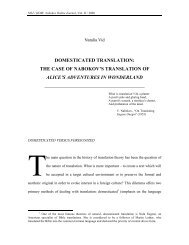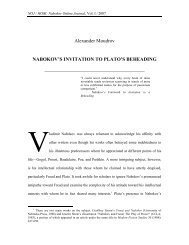You also want an ePaper? Increase the reach of your titles
YUMPU automatically turns print PDFs into web optimized ePapers that Google loves.
Nabokov Online Journal, Vol. V (2011)<br />
_______________________________________________________________________<br />
potential salvation from the unnatural, inauthentic life she leads with Humbert. Filthy is<br />
able to fulfill this role because he does not seek to sexually exploit Lo, but only engage in<br />
some wholesome fun at Humbert’s expense and bestow freedom upon his poor captive.<br />
Everyone is a bad artist in Pera’s book, but some pretend to be good, while others are<br />
reconciled to their own bad taste. Crime exists, but it does not hinge on poor judgment.<br />
LO AND LAW: DMITRI NABOKOV’S LAWSUIT<br />
Dmitri Nabokov’s initiation of a copyright infringement lawsuit against Pera’s book<br />
constituted an attempt to revitalize his father’s correlation between crime and bad taste.<br />
Copyright laws do not differentiate whether intellectual property theft is committed in<br />
good taste or bad, but both Dmitri Nabokov and his lawyer allowed themselves to muddle<br />
their legal arguments with constant references to the poor quality of Lo’s Diary. In<br />
documents filed in court Pera’s novel was branded “inferior and amateurish<br />
merchandise” (quoted in Blumenthal), and in an interview, Nabokov’s lawyer Peter<br />
Skolnik stated that “number one, it is a very bad book,” describing it subsequently as<br />
“vulgar,” “badly done,” “lewd,” “tawdry,” “cheap,” and “crass” (quoted in Manus). The<br />
aim of such characterizations, albeit an unstated, possibly unconscious one, seems to be<br />
the reassertion of the parallel – irrelevant in law, but vital in the context of Vladimir<br />
Nabokov’s aesthetics – between crime and bad taste.<br />
The heading of Dmitri Nabokov’s foreword, “On a Book Entitled Lo’s Diary,”<br />
recalls his father’s afterword “On a Book Entitled Lolita,” written to accompany Lolita’s<br />
first appearance in the U.S. (in the form of excerpts published in The Anchor Review in<br />
1957). Undoubtedly, this apologia for Lolita, which features some of Nabokov’s major<br />
pronouncements on aesthetics, was meant to preempt the negative reaction of hostile<br />
readers; considering the difficulties encountered in publishing the book, Nabokov’s<br />
concerns in this regard seem justified. The afterword was necessary, and the text unable<br />
to speak for itself, because of a readerly unsophistication afoot that refused to distinguish<br />
between bad fiction and sublimely ethical art.<br />
19

















